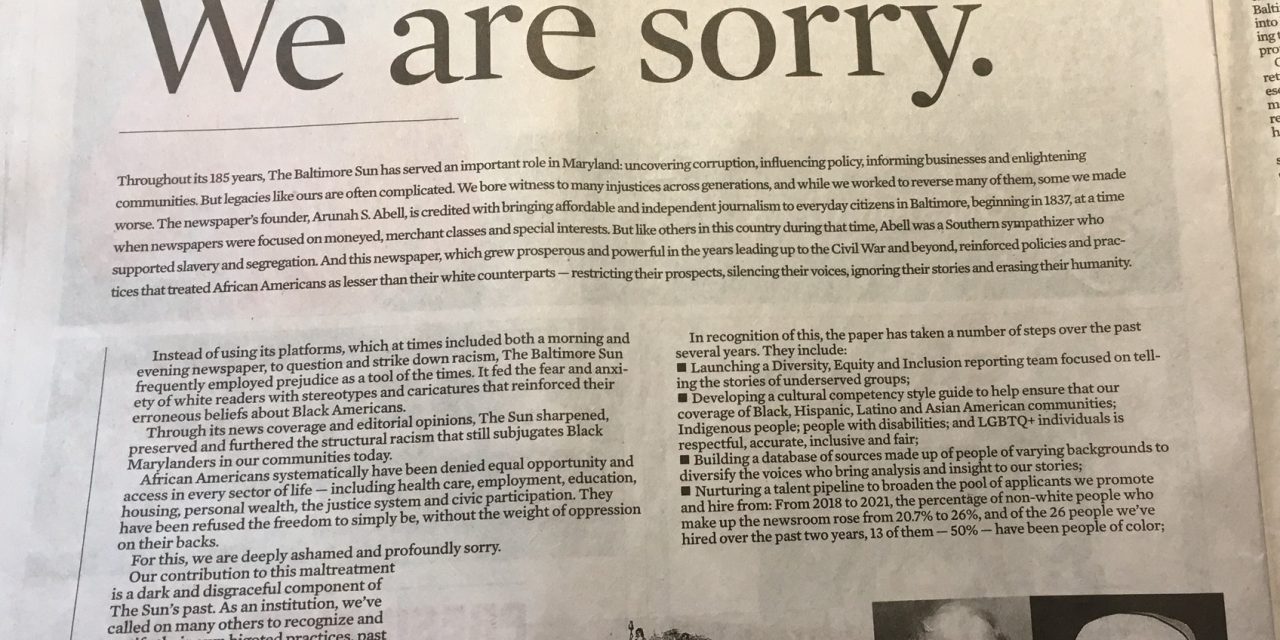On Sunday, the Baltimore Sun wrote what they called “an apology,” but which is better described as what my field of rhetoric calls an “apologia.”
Rhetorical scholars B. L. Ware and Wil A. Linkugel wrote the article of record on apologetic discourse about 50 years ago in which they point out that the purpose of such discourse in rhetorical theory typically, in response to criticisms of one’s “moral nature,” is to make a public “self-defense,” “reconcil[ing] a derogatory charge with a favorable view of [one’s] character.”
Apologias include “denial of intent,” “bolstering,” or identifying that of which the audience thinks highly, “differentiation,” separating the facts of the apology from the larger context within which the audience sees the “transformation,” and the accused’s “request for a suspension of judgment until his [or her] actions can be viewed from a different temporal perspective.”
The Sun apologia’s differentiation moves the audience to a more general positive view of the situation. In this case, the paper is expiating its sins, which by implication are exclusively sins of racial prejudice, by a variety of actions, including stylistic changes, hiring changes, more attentiveness, favorable attention etc.
In The Sun’s “self-defense” stance,” as Ware and Linkugel, term it, the major goal is “clearing [their] name.”
The article simply does not, or should not, work for the general audience of fair-minded readers.
The Sun’s long-term journalistic shortcomings, particularly in the last several years and exacerbated therein, are not singularly those of racial prejudice, though their case in articulating their own historic appallingly anti-Black and anti-minority yellow journalism is indisputable. Their larger journalistic crime is their lack of disinterested reporting and editorializing in favor of ideological agenda-driven advocacy journalism. This problem continues with their apologia.
Yes, again, there is a horrible record of racist writing at The Sun, but the limited corrections they promise with their diversity, equity and inclusion team, more emphasis on anti-police complaints, more attention to minority communities’ needs and accomplishments, etc. do not negate the newspaper’s journalistic deficiencies of exclusion of conservative perspectives and, yes, criticism of Black and white communities’ profound inadequacies, including fatherlessness, violence and irresponsible and criminal political leadership.
Nor do they in their apologia include other journalistic ideological inadequacies, such as: the lack of coverage of liberal politician’s prejudices, such as the citing in their apologia Sen. Jill Carter without mentioning (ever) her support of anti-Semite Louis Farrakhan, the nation’s most infamous and notorious despiser of all things Jewish; their mentioning and regret (finally) for the 2002 anti-Michael Steele editorial without pointing out the anti-conservative prejudice and crusade of the paper, which led to The Baltimore Sun’s concomitant op-ed page’s not having a positive article about Gov. Robert L. Ehrlich or his team, including Mr. Steele, by name for the entire election year of 2006; and there is nothing about the virtual cancelling of Fox media from coverage of Baltimore’s mayor and states attorney, as well as the literal cancelling of excellent op-ed writer Cal Thomas, and other conservative voices. I could go on…
Their masthead, mentioned in the apologia, should replace “Light for All” with “Light for Some,” but, better, they should truly become a newspaper without a political agenda, and then it could be a daily paper that all of Baltimore and Maryland could respect.
In sum, the Sun cannot see the forest for the trees: their journalism now as much as ever is an ideological paper without serious disinterested reporting, save for their excellent sports section. Their apologia is correct, but limited to conform with their current ideological bent. As the French say, the more things change the more they stay the same.






Recent Comments